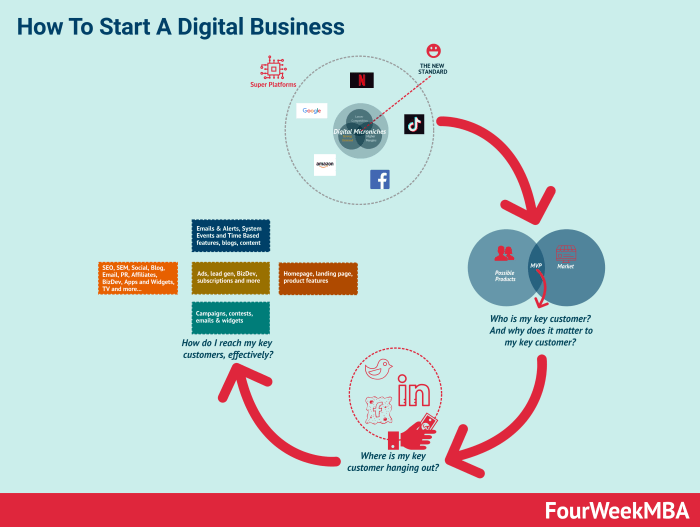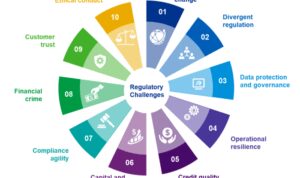Embark on the journey of starting a digital business without the need for coding skills. Dive into the world of market research, business models, website creation, content marketing, and more with ease.
Discover the secrets to launching a successful digital business without touching a single line of code.
Research and Planning
Market research is a crucial step before starting a digital business as it helps you understand your target audience, competition, and industry trends. By conducting thorough research, you can make informed decisions and tailor your products or services to meet the needs of your customers.
Importance of Market Research
Market research allows you to gather valuable insights that can guide your business strategy. It helps you identify market gaps, assess the demand for your offerings, and understand the preferences of your potential customers. Without this information, you may end up investing time and resources in a product or service that does not resonate with your target market.
- Use tools like Google Trends to analyze search trends and interest over time.
- Platforms like SEMrush and Ahrefs can provide valuable data on your competitors' online presence and s they are targeting.
- Social media analytics tools such as Sprout Social or Hootsuite can help you understand your audience demographics and engagement metrics.
Identifying Target Audiences and Their Needs
To identify your target audience without coding skills, you can leverage online surveys, social media polls, and feedback forms to gather insights directly from your potential customers. Analyzing this data can help you create buyer personas and tailor your marketing strategies to address their specific needs and pain points.
- Utilize platforms like SurveyMonkey or Typeform to create and distribute surveys to collect feedback from your target audience.
- Engage with your audience on social media to understand their preferences, challenges, and interests.
- Monitor online reviews and comments to gather insights into what customers like or dislike about similar products or services in the market.
Choose the Right Business Model
Starting a digital business without coding skills requires choosing the right business model that aligns with your goals and resources. Let's explore different digital business models suitable for non-coders and how to select a profitable one.
E-Commerce
E-commerce involves selling products or services online through a website or online marketplace. You can use platforms like Shopify, WooCommerce, or Etsy to set up your online store without coding. The key is to source or create products that cater to a specific niche and offer a seamless shopping experience for customers.
Affiliate Marketing
Affiliate marketing is a model where you earn a commission by promoting other companies' products or services. You can create content like blog posts, videos, or social media posts to drive traffic to affiliate links. Platforms like Amazon Associates and ClickBank offer affiliate programs that you can join without coding knowledge.
Dropshipping
Dropshipping is a business model where you sell products to customers without holding inventory. When a customer places an order, the product is shipped directly from the supplier to the customer. Platforms like Oberlo and AliExpress make it easy to start a dropshipping business without coding.
The key is to find reliable suppliers and focus on marketing and customer service.Choosing a profitable business model without coding skills requires considering factors like market demand, competition, and scalability. Research different models, evaluate your strengths and resources, and select a model that aligns with your interests and goals.
Remember, success in digital business often comes from a combination of innovation, persistence, and continuous learning.
Website Creation and Design
Creating a professional website without coding skills is easier than you think. With the rise of user-friendly website builders like Wix, Squarespace, and Shopify, anyone can create a stunning website for their digital business without writing a single line of code.
These platforms offer a wide range of templates, drag-and-drop design features, and customizable options to help you bring your vision to life.
Choosing the Right Website Builder
When selecting a website builder for your digital business, consider factors such as ease of use, design flexibility, pricing, and customer support. Here are some insights on popular website builders:
- Wix:Known for its intuitive interface and extensive template library, Wix is a great choice for beginners. It offers a variety of design options and customization features to help you create a unique website.
- Squarespace:Squarespace is favored for its sleek and modern templates, making it ideal for businesses with a strong visual focus. It also provides robust e-commerce capabilities for selling products online.
- Shopify:If you plan on running an e-commerce store, Shopify is a top choice. It offers a user-friendly platform for setting up and managing online stores, with features like inventory management, payment processing, and marketing tools.
The Importance of User-Friendly Design
A user-friendly design is crucial for digital businesses as it enhances the overall user experience, encourages engagement, and drives conversions. When designing your website, consider the following tips:
- Keep navigation simple and intuitive to help visitors find information easily.
- Optimize your website for mobile devices to ensure a seamless experience across all screens.
- Use high-quality images and visuals to capture attention and communicate your brand effectively.
- Focus on clear messaging and calls to action to guide visitors towards desired actions.
Content Creation and Marketing

Creating engaging content is essential for attracting and retaining customers to your digital business. Without coding skills, there are various strategies you can employ to develop compelling content that resonates with your target audience.
Social Media Promotion
- Utilize different social media platforms such as Facebook, Instagram, Twitter, and LinkedIn to reach a wider audience.
- Create visually appealing posts with high-quality images and videos to increase engagement.
- Interact with your followers by responding to comments, messages, and mentions to build a strong relationship with your audience.
Email Marketing and Techniques
- Build an email list by offering valuable content or incentives to encourage visitors to sign up for your newsletter.
- Segment your email list based on customer preferences to deliver personalized content that resonates with each subscriber.
- Optimize your website and content for search engines by incorporating relevant s, meta descriptions, and alt tags to improve your search engine rankings.
- Regularly update your content and website to ensure it remains relevant and valuable to your audience.
Outsourcing and Automation
Outsourcing and automation are crucial aspects of running a successful digital business without coding skills. By leveraging these strategies, you can focus on the core aspects of your business while delegating tasks and streamlining processes efficiently.
Outsourcing Tasks
- Graphic Design: Platforms like Fiverr, Upwork, and 99designs offer a pool of talented designers who can create logos, social media graphics, and other visual assets for your business.
- Content Creation: Freelance writers on platforms like Freelancer and Textbroker can help you generate blog posts, articles, and website copy to engage your audience.
- Customer Support: Outsourcing customer support to companies like Zendesk, LiveChat, or even hiring virtual assistants can ensure timely responses and excellent service for your customers.
Benefits of Automation Tools
- Increased Efficiency: Automation tools like Buffer for social media scheduling, Mailchimp for email marketing, and Zapier for integrating different apps can streamline processes and save time.
- Improved Accuracy: By automating repetitive tasks, you reduce the risk of human error and ensure consistency in your business operations.
- Cost-Effective: Investing in automation tools can be more cost-effective in the long run compared to hiring employees for manual tasks.
Popular Outsourcing Platforms and Automation Software
- Outsourcing Platforms: Fiverr, Upwork, Freelancer, 99designs, Textbroker
- Automation Software: Buffer, Mailchimp, Zapier, Hootsuite, Trello
Final Conclusion

As we wrap up our discussion on starting a digital business without coding skills, remember that with the right tools and strategies, anyone can carve their path in the digital realm. Embrace the possibilities that lie ahead and watch your business thrive!
Questions and Answers
Can I start a digital business without any coding knowledge?
Absolutely! With the plethora of tools and platforms available today, you can easily kickstart your digital business without delving into coding.
What are some popular website builders for non-coders?
Popular website builders like Wix, Squarespace, and Shopify offer intuitive interfaces that allow you to create professional websites effortlessly.
How important is market research before starting a digital business?
Market research is crucial as it helps you understand your target audience, competition, and market trends, setting a solid foundation for your business.
Is outsourcing tasks like content creation and design advisable for digital business owners?
Outsourcing can be a game-changer, allowing you to focus on core business activities while experts handle specialized tasks efficiently.






